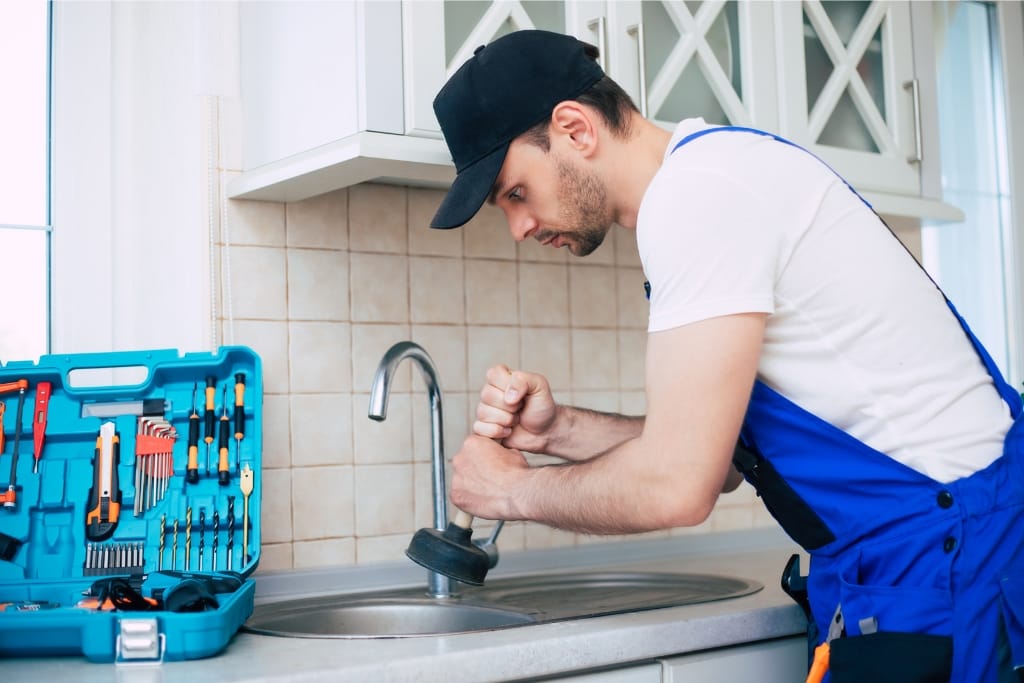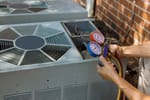Taking care of your home's plumbing system is crucial for the longevity of your property and the health of its inhabitants.
A well-maintained network of pipes ensures the smooth and efficient delivery of water, and more importantly, its sanitary disposal.
Ignoring it can lead to inconvenient disruptions, costly repairs, and even health risks.
Here, we offer 10 indispensable home plumbing tips that every homeowner should keep under their belt.
These simple yet effective insights can help you prevent and tackle common plumbing issues, saving you significant time, money, and stress.
1)) Fix Leaking Faucets
Dripping faucets can quickly disturb your peace by creating a constant tapping sound while wasting a significant amount of water.
Check for corroded or worn-out gaskets and disassemble the fixture to replace these parts.
This should fix the leakage issue and save you money on energy bills.
Tips to Fix Leaking Faucets:
- Identify the Type of Faucet: The first step in fixing a leaking faucet is identifying the type of faucet you have. There are generally four kinds – ball, cartridge, disc, and compression faucets. Understanding your faucet's design can significantly aid in resolving the issue.
- Gather Necessary Tools: Ensure you have the necessary tools on hand. This usually includes a wrench, screwdriver, and possibly a hex key, depending on your faucet type. Having these ready can expedite the repair process.
- Replacement Parts: Most faucet leaks occur due to worn-out components. So, it's wise to have replacement parts like O-rings, valve seats, or cartridges readily available. The replacement parts must match your faucet's specific model and brand.
Addressing a leaking faucet promptly can save you from needless water waste and an inflated utility bill.
By identifying the type of your faucet, arming yourself with the necessary tools, and having the correct replacement parts on hand, you can effectively tackle this common household issue.
If the problem persists, don't hesitate to reach out to a professional plumber.
2)) Check Toilet Leaks
A leaky toilet can cause a spike in your water bill. Put food coloring in the toilet tank and wait for 30 minutes without flushing.
If you notice coloring in the bowl, then there's a leak that requires a plumber's attention.
Tips to Check for Toilet Leaks:
- Perform a Dye Test: One simple way to check for leaks is through a dye test. Add a few drops of food coloring to the toilet tank and let it sit for about 30 minutes without flushing. If the color appears in the bowl, you've got a leak.
- Examine the Flush Valve Assembly: Leaks often occur due to issues with the flush valve assembly. Examine the flapper for any wear or damage. If it's not sealing the way it should, it may be time to replace it.
- Check the Fill Valve for a Leak: Another common source of leaks is the fill valve. If the water level in the tank is over the fill line, check the fill valve assembly. It might need tightening or replacement.
Detecting and fixing toilet leaks early can prevent unnecessary water waste and keep your water bills in check.
By conducting a simple dye test, inspecting the flush valve assembly, and checking the fill valve, you can identify potential issues and take corrective measures.
If the issue persists, hiring a professional plumber is a sound decision to ensure proper rectification and prevent further damage.
3)) Water Heater Maintenance
Over time, minerals can build up in your water heater tank, reducing efficiency and increasing energy bills.
To solve this, drain the water heater tank to remove the sediment present, prolonging the lifespan of your water heater.
Tips for Water Heater Maintenance:
- Regular Flushing: Regularly flush your water heater to remove sediment buildup. This improves its efficiency and prolongs its lifespan. Ensure to follow safety instructions while doing so, as the water will be extremely hot.
- Inspect the Anode Rod: The anode rod in your water heater prevents rusting. Inspect it annually for any significant wear and consider replacing it every five years or when it's significantly eroded.
- Check the Pressure Relief Valve: The pressure relief valve is a safety feature that prevents excessive pressure buildup. Lift the valve’s tab a few times to let out some water, ensuring it works correctly. If it doesn’t release water, you’ll need to replace the valve.
Regular maintenance of your water heater can significantly enhance its efficiency and extend its lifespan.
By flushing the heater regularly, inspecting the anode rod, and checking the pressure relief valve, you can prevent potential issues and keep your appliance in optimal condition.
If you notice any persistent issues or are unsure about the maintenance process, it is always advisable to consult with a professional plumber.
4)) Mainline Stoppage Prevention
Clogged kitchen sinks or bathroom drains are a common occurrence. Regularly flushing the mainline with hot water and a mixture of baking soda and vinegar helps prevent clogs and keeps drains flowing freely.
Tips for Mainline Stoppage Prevention:
- Regular Flushing: Make it a habit to flush your mainline with hot water every week. This routine can help dislodge minor clogs and prevent them from building up into a more serious blockage.
- Natural Cleaning Solution: Use a mixture of baking soda and vinegar as a natural cleaning solution. Pour half a cup of baking soda followed by half a cup of vinegar into the drain, and let it sit for 15-20 minutes. Then rinse with hot water. This can help break down grease and food particles that cause clogs.
- Avoid Dumping Grease: Avoid pouring grease or oil down the drains. These substances solidify as they cool, leading to clogs. Instead, let them cool and dispose of them in the trash.
Proactive measures are key in preventing mainline stoppages.
Regular flushing, using natural cleaning solutions such as baking soda and vinegar, and avoiding the dumping of grease into drains can significantly reduce the risk of clogs.
If you encounter a persistent blockage, don't hesitate to seek professional help to avoid causing further damage to your plumbing system.
5)) Drain Filters
Placing drain filters in your shower, tub, and sink can help trap hair and other debris, preventing clogs from forming.
Tips for Using Drain Filters:
- Choose the Right Size: Ensure that the drain filter you choose fits your drain perfectly. An ill-fitting filter might allow debris to pass through or may not stay in place.
- Clean Regularly: Drain filters can quickly accumulate hair and other debris. Make sure to clean them regularly to keep your drains flowing freely.
- Replace When Necessary: Over time, drain filters can wear out and become less effective. Monitor their condition and replace them when necessary to maintain their effectiveness.
Using drain filters effectively can be a game-changer in maintaining your plumbing system.
By choosing the right size, cleaning the filters regularly, and replacing them when needed, you can prevent debris from causing blockages in your drains.
Remember that filters are not a complete solution and regular drain maintenance should still be a priority.
If you encounter any persistent issues, don't hesitate to reach out to a plumbing professional.
6)) Clean Gutters
Leaves and debris buildup in your gutters can lead to clogs and flooding issues. Regular gutter maintenance and cleaning can save you from costly repairs.
Tips for Cleaning Gutters:
- Regular Cleaning: Depending on the number of trees near your home, aim to clean your gutters at least twice a year, typically in spring and fall. This helps to ensure they are free from debris and function correctly.
- Safety Measures: Always ensure you use a sturdy, extendable ladder, preferably with someone to secure it at the bottom. Wear gloves to protect your hands from sharp objects and use a gutter scoop or plastic spatula to remove the debris.
- Check for Leaks: After removing the debris, flush the gutters with a garden hose to check for leaks. If you identify any, seal them with a gutter sealant.
Regular cleaning and maintenance of your gutters is a simple yet effective way to prevent water damage to your property.
Ensuring a clear pathway for water to flow away from your home reduces the risk of flooding and structural damage.
By incorporating regular cleanings, safety measures, and leak checks into your routine, you can keep your gutters in top shape.
If you encounter any serious issues or need assistance, it is always a good idea to call a professional.
In the world of home maintenance, prevention is always better than cure.
7)) Garbage Disposal Maintenance
Avoid putting fibrous foods like banana peels, celery, and corn husks in your garbage disposal, as they can damage the blades.
Use dish soap and cold water to clean and sharpen blades.
Tips for Garbage Disposal Maintenance:
- Mind What You Dispose: Not all kitchen waste should go into the garbage disposal. Avoid fibrous foods like banana peels, celery, and corn husks, as they can tangle and dull the blades.
- Regular Cleaning: Regularly clean your garbage disposal to prevent buildup and odors. Run cold water and dish soap through the system to clean and sharpen the blades.
- Ice Cubes for Sharpening: Every once in a while, throw a few ice cubes into the garbage disposal and run it. The ice cubes will help sharpen the blades and break up any residue clinging to them.
Proper garbage disposal maintenance not only prolongs the life of your appliance but also promotes a cleaner and odor-free kitchen environment.
Being mindful of what you dispose of, carrying out regular cleaning, and using ice cubes to sharpen the blades are effective strategies for keeping your garbage disposal running smoothly.
If you notice persistent problems, consider seeking professional assistance to prevent further damage to your system.
A well-maintained garbage disposal is key to a hassle-free kitchen.
8)) Know Your Plumbing
Knowing where the main water shutoff valve, water heater valve, and gas shutoff valve are located can help in emergencies. Ensure these valves are easy to turn off in an emergency.
Tips for Knowing Your Plumbing:
- Locate Main Valves: Identify the location of your main water shutoff valve, water heater valve, and gas shutoff valve. Knowing exactly where these are can save precious time in emergencies.
- Ensure Accessibility: Make sure these valves are easily accessible and are not obstructed by any furniture or appliances. In an emergency, you'll need to reach them quickly.
- Learn How to Operate: Familiarize yourself with how to switch these valves off. If you're unsure, seek advice from a professional plumber. It's crucial to know how to shut the water and gas off in your property in case of emergencies.
Understanding your home's plumbing system can be a lifesaver in emergencies.
Familiarizing yourself with the location of main valves, ensuring their accessibility, and learning how to operate them can prevent potential property damage and ensure the safety of your household.
If you're ever in doubt, don't hesitate to consult with a professional plumber.
It's always better to be prepared and knowledgeable when it comes to your home's plumbing system.
9)) Pipe Insulation
Proper insulation of pipes that are located in unheated areas can prevent them from freezing and bursting during severe weather conditions.
Tips for Pipe Insulation:
- Identify Vulnerable Pipes: First, identify pipes that are in unheated areas such as the garage, basement, or exterior walls. These are the pipes most likely to freeze during cold weather.
- Choose the Right Insulation: Use specially designed pipe insulation or heat tape for these pipes. Ensure the insulation covers the entire length of the pipe to provide adequate protection.
- Professional Consultation: If you're unsure about how to properly insulate your pipes, consider hiring a professional. This can be particularly helpful for pipes that are hard to reach or if you have a large number of pipes to insulate.
Proper insulation of pipes is a crucial aspect of home maintenance, especially for those located in unheated areas.
By identifying vulnerable pipes, using the right insulation materials, and seeking professional advice when needed, you can protect your pipes from freezing and bursting in severe weather conditions.
Prevention is key to maintaining the longevity and effectiveness of your home's plumbing system, and proper pipe insulation goes a long way in achieving this.
10)) Regular Plumbing Inspections
Annual plumbing inspections and professional cleaning are vital in keeping your pipes healthy.
This helps find small problems before they get bigger, preventing costly repairs.
Tips for Regular Plumbing Inspections:
- Schedule Annual Check-ups: Make it a habit to schedule annual plumbing inspections with a qualified professional to ensure your system is functioning optimally.
- Monitor for Minor Issues: Keep an eye out for minor issues such as slow drains, small leaks, or unusual noises. These may indicate larger issues that need attention before they escalate.
- Professional Cleaning: Consider professional cleaning services for your pipes during inspections. This can help eliminate buildup and extend the life of your plumbing system.
Implementing regular plumbing inspections is a proactive approach to maintaining the health and efficiency of your home plumbing system.
By scheduling annual check-ups, monitoring for minor issues, and opting for professional cleaning services, you'll be able to prevent small problems from escalating into major, costly repairs.
Nurturing the longevity of your plumbing system is a worthwhile investment for the comfort and safety of your home.
Conclusion
Maintaining your home's plumbing system does not have to be a daunting task.
By following these simple yet effective tips, you can preserve the efficiency of your home's water network, save on energy bills, and avert costly repairs in the long run.
Always remember that prevention is better than cure, and a little proactive effort can go a long way in ensuring the longevity of your system.
However, if a major issue arises, never hesitate to call a professional plumber to save your property from significant damage.
Related Articles and Guides
- 10 Plumbing Tips For Spring Every Homeowner Should Know
- 10 Plumbing Tips For Summer You Can't Afford To Miss
- 10 Fall Plumbing Tips To Keep Your Pipes Running Smoothly
- 10 Winter Plumbing Tips To Help You Avoid Costly Repairs
- 10 Plumbing Hacks To Save Time And Money
Download Our Free E-book!








